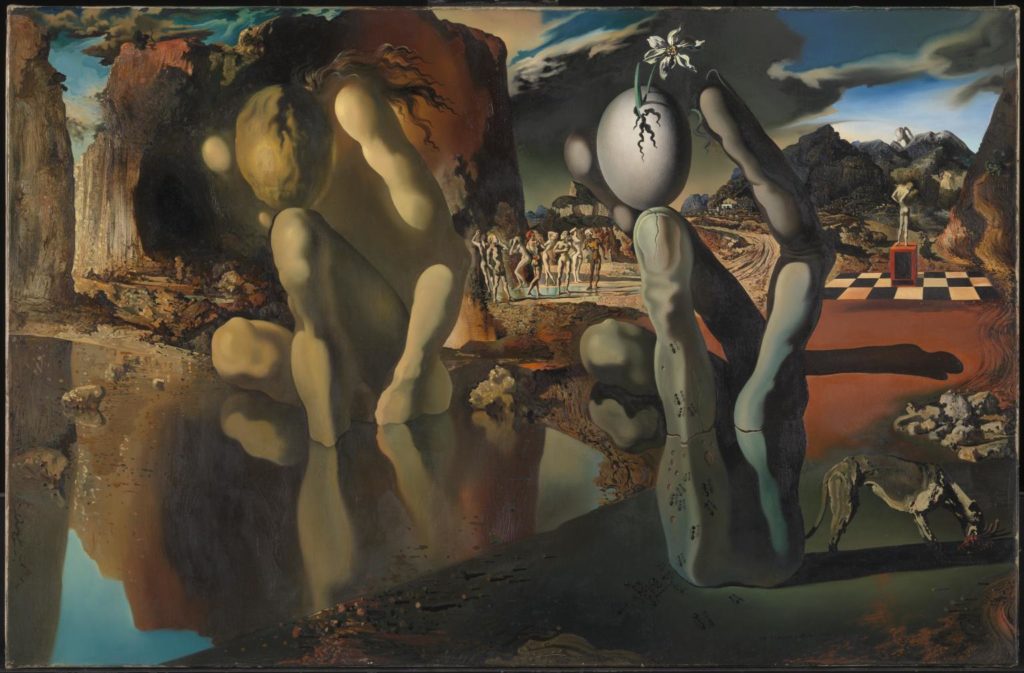We are conflicted creatures. What often seems easiest is rarely what we must do. Our instincts have not prepared us for the civilization and the affluence that we have today. The world has changed since we have evolved.
It is self-consciousness that seems to bring tense situation to a place of reasonable compromise. We are able to think about ourselves as members of a group and we can make ourselves into the people that can cohere or not to civilization’s demands. This conflict becomes central to how we live our lives and perceive ourselves, but it all starts with our need to control our natural impulses.

Self-Controlling Animals
With language and the ability to predict consequences of our actions, we can look at our current situation and think about how we can act in order to give us beneficial consequences further down the line than the immediate moment.
We’ve all experienced self-constraint. We consciously resist an impulse because it is inappropriate and will likely cause us future harm. We think it would be regrettable to lash out at our boss, it would be regrettable to eat too much dessert, it would be regrettable to drink too much water before a long drive. Even if we want to do these things, we usually have it within us to deny ourselves the gratification. This sort of self-control requires an ability to judge our emotions—judge our judgements.
In being civilized and self-conscious, we do not merely want, but we want to want or hate to want. We do not merely hate, but we ought to hate, or ought not. The judgements we have about our emotions are called meta-emotions, and they are what make humans so unique among animals.
“A person can feel ashamed for having felt or expressed anger toward a loved one. The meta-emotion in this case is shame, which takes as its object the individual’s direct experience of anger, and may motivate the individual to inhibit anger or at least suppress angry behavior in the future.”
from Handbook of Emotions, edited by Michael Lewis, Jeannette M. Haviland-Jones, and Lisa Feldman Barrett
To exercise self-control is not exactly a meta-emotion. But a meta-emotion was at the genesis of self-control. We no longer have to resist acting like a buffoon in the streets as fun as it might be for a child, we have long learned the habit of public seriousness. The meta-emotion might only come when you question the habit, or if you accidentally acted like a buffoon, and are thinking about what an ass you made of yourself.
This helps us to understand the self-creation of our meta-emotions. Because when you have a conscious meta-emotion, you are making a self-judgement. You are claiming the existence of a self and making what was totally subjective into something represented by language. Now you say, “what an ass I would be!”
“Conscious states in this sense involve a form of meta-mentality or meta-intentionality in so far as they require mental states that are themselves about mental states. To have a conscious desire for a cup of coffee is to have such a desire and also to be simultaneously and directly aware that one has such a desire.”
Robert van Gulick in Stanford Encyclopedia of Philosophy
The claiming that you have a desire for a cup of coffee takes into a self-conscious network of memories and representations that tells you what to think you want. But the desire itself is not real; it is perhaps only approximate. The only way you think you know you need coffee is the subtle feelings that you have represented by “being in need of coffee.”
Meta-Emotions and Self-Consciousness
What happens to the original impulse? It is only when we hesitate over the impulse that we can make a meta-emotion about it. The original emotion become part of the situation and in becoming so, it becomes an object. What was so intimate with you, the subjective feeling and perception of the emotion, has become the object of another feeling and appraisal. This is a self-objectification.

When you create a concept around a pattern of subjective experience, it can become part of the situation which you feel another emotion as a result. The tools you use to conceptualize it help you to orient it in your situation. It is what the original emotions means to the ego that creates the meta-emotion.
These judgements come every time we become conscious of ourselves. I can never simply be angry without also feeling some sort of emotion towards myself when I become conscious that it is me that is angry, rather than having total focus on the stupidity of the person that cut me off on the highway.
How often when we, when conscious of ourselves, do you not react in some meta-emotional way? When realizing your anger, do you not sometimes feel self-righteous and justified, or do you feel sometimes ashamed and immoral?
When we feel we “ought to” or “should” want something, it is meta-emotion. Sometimes we follow through with the oughts, and sometimes we cave in. You ought to love so-and-so. You ought to enjoy learning. You shouldn’t let people talk to you that way. These oughts are the ammunition of meta-emotions. These oughts, though, can weigh heavily on our lives.
Self-Esteem and Meditation
While creating the self through our meta-emotions, we have also created the self-esteem. How often these meta-emotions end in conflict or failure to appeal to them, can destroy someone’s self-esteem. The meta-emotional shame we feel about your anger, sadness, or even joy is no mere emotion. It is a judgement on the essential nature of yourself.
“I have found that most of the people I consider slightly off their base are merely victims of too much introspection”
Carl Laemmle in On the Meaning of Life
There is an idea that reflection makes people depressed, and in a sense that can be true. The more we become conscious of our emotions, the more we can judge them as wrong. And any action or feeling, give the right logical reasonings can be made wrong and shame provoking. A common example is the ability to be ashamed of the things we are not aware of in our lives that might be complicit in unethical practice. Something as innocuous as the food you eat could cause a highly-introspective person to feel shame if it did not come from an ethical source.

We build ourselves out of the moments where we reflect on our feelings and judging them to be good or evil. The source of the judgements we make are complex and sometimes wrong, and they can wreak havoc on our psyches.
The solution is not to think of these meta-emotions as higher goals, but to listen to them in a somewhat stoic way. This is common practice in Zen meditation. We watch our thoughts go b without attributing value judgements on them. In this way, we can, perhaps for the first time, actually hear the original emotion beneath all the judgement. Meditation is like a meta-emotion in that it makes emotion conscious, but it is different in that it does not judge it. Its “judgement” is acceptance, not rejection nor righteousness.
“A profoundly accepting, inclusive attitude toward all our internal experience, a nonjudgemental approach, is a hallmark both of the analyst’s free-floating attention and of the Buddhist mindfulness.”
Joseph Bobrow in Psychoanalysis and Buddhism
